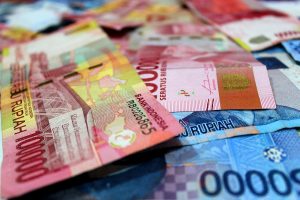The Indonesian economy, like all economies throughout the world, suddenly finds itself in a precarious position. Even once the COVID-19 pandemic has been contained, GDP growth is obviously going to grind to a halt. Millions of people will likely have to make their way back into the workforce. Businesses will face a long road to recovery after having been starved of revenue for an as yet unknown period of time. Indonesian manufacturers will find a very soft global market in which to export their goods and services.
Every economy in the world is facing these same set of problems, but in Indonesia they are compounded by the fact that the country runs one of the larger emerging market current account deficits. Under normal circumstances, this would not be a problem. But during times of high global uncertainty investors sell off riskier assets and seek safer harbors such as cash or U.S. Treasury bonds. These capital outflows hit emerging markets running current account deficits particularly hard.
About a month ago, the rupiah was at around 14,000 to the U.S. dollar. Since the onset of the crisis, it spiked at one point to nearly 17,000 before settling this week around 16,000 thanks to aggressive interventions by Bank Indonesia and an economic rescue package announced in the United States. If the rupiah stabilizes around this point, we can probably breathe a bit easier. If it continues to depreciate, Indonesia will be facing an impending liquidity crunch at the same time as a massive simultaneous supply and demand shock. Any entity holding dollar-denominated debt will find it increasingly difficult to service it, especially as revenue is likely to dry up for a time. Massive defaults and capital controls are not unthinkable.
The good news is a significant amount of recently issued debt instruments in Indonesia have been denominated in rupiah rather than dollars, which may help to cushion the worst of it. Virtually every other emerging market currency is also under pressure, though most not as severely. This means it is likely that international monetary authorities will engineer some type of wide-scale debt restructuring to avoid mass defaults or the imposition of capital controls. The IMF will also hopefully extend special drawing rights to emerging markets, which will help them from seizing up.
While the monetary side of things appears like it may be stabilizing (to the extent that anything can be called stable at this point in time) the challenge that Finance Minister Sri Mulyani Indrawati faces is perhaps more intractable. No matter what happens Indonesia will require some degree of fiscal stimulus to keep the economy running — even on fumes — until demand recovers. Yet Indonesia is not like the United States or other major economies; it does not have a limitless fiscal bazooka at its disposal.
Indeed, the government is legally prohibited from running a fiscal deficit in any year in excess of 3 percent of GDP. The Indonesian economy is roughly around $1 trillion in size, so under business as usual deficit spending would be capped at around $30 billion. The government is looking to raise that cap, but will ultimately probably find itself with perhaps $20-30 billion of extra fiscal firepower to direct at combating the virus and preventing the total collapse of the economy.
These fiscal constraints and the shaky state of Indonesia’s capital markets are likely the real reason President Joko Widodo is reluctant to impose a strict national lockdown. Many Indonesians, particularly in the informal sector, survive on subsistence wages of $100-200 per month and if they were to lose that income due to lockdowns, the impact would be hard to predict. Indonesia is therefore in a tough spot – waging a public health war against COVID-19 while fighting off recession using limited fiscal resources in the face of a possible liquidity crisis.
The good news is that competent technocrats are in charge at the most important institutions such as Perry Warjiyo at Bank Indonesia and Sri Mulyani at the Ministry of Finance. There is zero chance they will be invoking the power of prayer to combat capital outflows and economic contraction, as the hapless Health Minister Terawan Agus Putranto did in his efforts to turn back the coronavirus in the outbreak’s early days. If looking for a silver lining in all this, the fact that the economic leadership in Indonesia is actually up to the task provides some encouragement as we wait to see what kind of fiscal stimulus they may ultimately roll out to beat back the specter of recession.
James Guild is a Ph.D. Candidate in Political Economy at the S. Rajaratnam School of International Studies in Singapore. His work has previously appeared in The Diplomat, New Mandala, East Asia Forum and Jakarta Post. Follow him on twitter @jamesjguild.

































